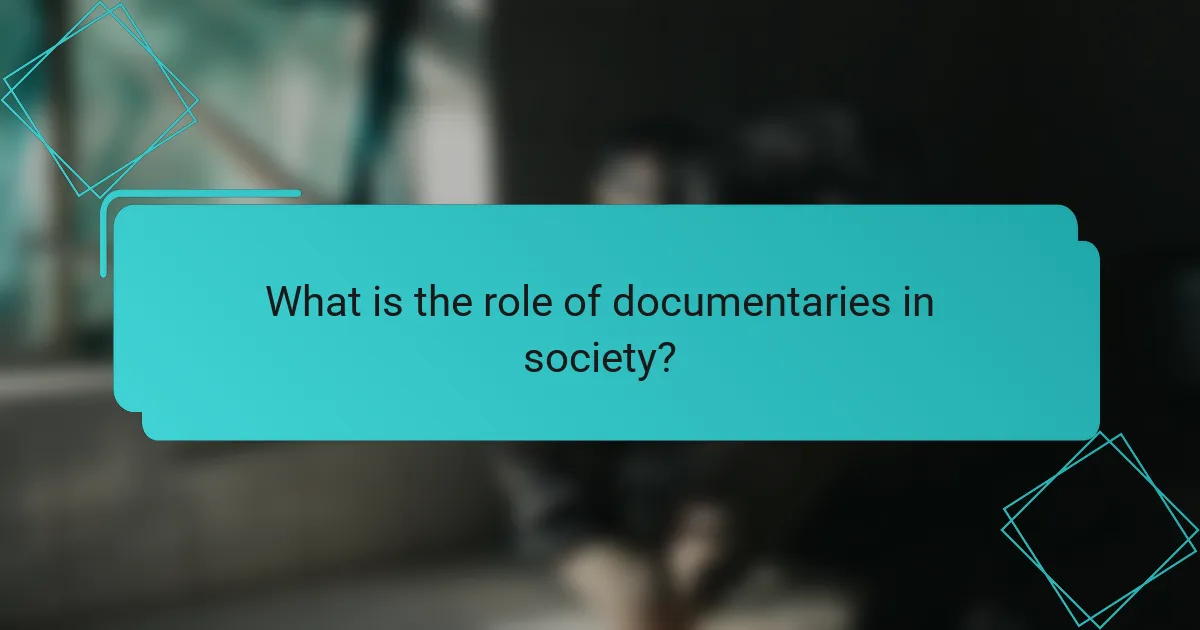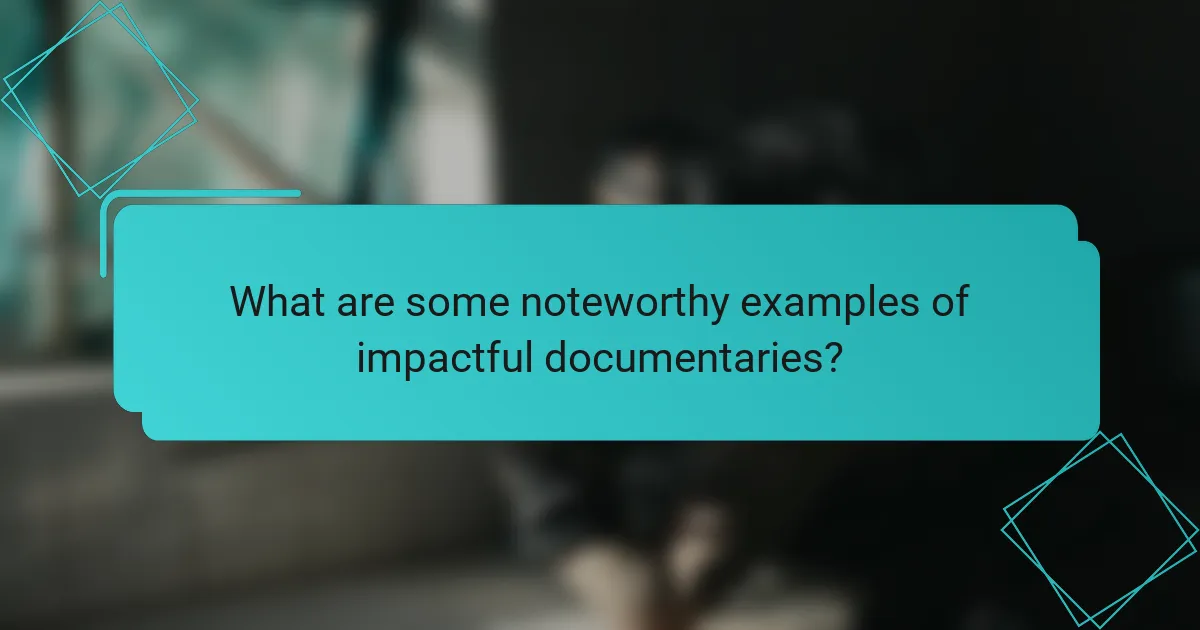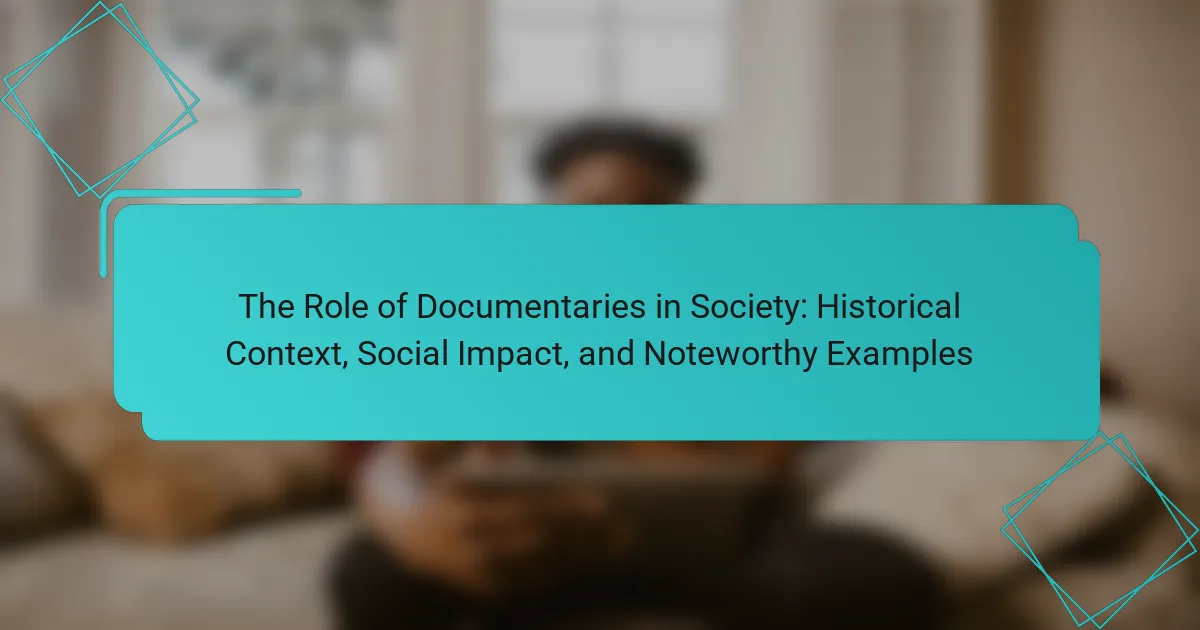Documentaries serve as a vital educational tool in society, providing insights into social, political, and environmental issues while raising awareness about underrepresented topics. They influence public opinion and inspire social change, as exemplified by impactful films like “An Inconvenient Truth,” which heightened awareness of climate change and spurred environmental activism. Additionally, documentaries preserve cultural histories and narratives, fostering empathy through personal storytelling that connects audiences with marginalized groups. Notable examples such as “The Act of Killing,” “13th,” and “Won’t You Be My Neighbor?” illustrate the profound social impact of documentaries by sparking discussions on critical issues like mass incarceration, systemic racism, and emotional intelligence.

What is the role of documentaries in society?
Documentaries play a crucial role in society by educating and informing the public. They provide insights into various social, political, and environmental issues. Documentaries often raise awareness about underrepresented topics. They can influence public opinion and inspire social change. For instance, “An Inconvenient Truth” brought global attention to climate change. This documentary led to increased environmental activism and policy discussions. Furthermore, documentaries can preserve cultural histories and narratives. They serve as a medium for storytelling that reflects diverse perspectives. Through factual representation, documentaries contribute to a more informed citizenry.
How have documentaries evolved over time?
Documentaries have evolved significantly over time. Early documentaries, like those from the 1920s, focused on observational filmmaking. They aimed to document reality without narrative interference. The introduction of sound in the 1930s allowed for more engaging storytelling. In the 1960s, the cinéma vérité movement emphasized a more immersive approach. This style encouraged filmmakers to capture events as they unfolded. The rise of television in the 1970s brought documentaries into mainstream media. This shift allowed for broader audience reach and increased production values. The digital age has further transformed documentaries through accessible technology. Filmmakers now utilize online platforms for distribution, reaching global audiences instantly.
What historical events influenced the development of documentaries?
The development of documentaries was influenced by several historical events. The invention of the cinematograph in 1895 allowed for the recording of real-life events. The First World War saw the use of film for propaganda, showcasing the power of visual storytelling. The Great Depression highlighted social issues, prompting filmmakers to document the struggles of everyday people. The Civil Rights Movement in the 1960s inspired documentaries that focused on social justice and activism. The Vietnam War led to an increase in anti-war documentaries, reflecting public sentiment. Technological advancements, such as portable cameras in the 1970s, democratized filmmaking, allowing more voices to be heard. These events collectively shaped the documentary genre into a tool for education, advocacy, and reflection.
How have technological advancements impacted documentary filmmaking?
Technological advancements have significantly transformed documentary filmmaking. Improvements in camera technology have made filming more accessible and affordable. High-definition cameras allow for clearer visuals, enhancing storytelling. Digital editing software streamlines the post-production process. Filmmakers can now edit footage more efficiently and creatively. The rise of online streaming platforms has expanded audience reach. Documentaries can now be distributed globally with minimal costs. Social media enables filmmakers to promote their work directly to viewers. These advancements have democratized documentary filmmaking, allowing diverse voices to be heard.
Why are documentaries important for public awareness?
Documentaries are important for public awareness because they inform and educate audiences about critical social issues. They present factual information in a compelling narrative format. This format engages viewers emotionally and intellectually. Documentaries often highlight underreported topics, bringing them to the forefront of public discourse. For example, the documentary “An Inconvenient Truth” raised awareness about climate change significantly. Studies show that documentaries can influence public opinion and inspire action. According to a study by the University of Southern California, viewers of social issue documentaries are more likely to engage in advocacy. Thus, documentaries serve as powerful tools for raising awareness and prompting societal change.
How do documentaries shape societal perspectives?
Documentaries shape societal perspectives by presenting real-life events and issues in a compelling narrative format. They inform viewers about diverse topics, fostering awareness and understanding. For instance, documentaries like “Blackfish” have raised awareness about animal rights and captivity. This specific film influenced public opinion, leading to changes in policies regarding marine parks. Documentaries often highlight underrepresented voices, providing a platform for marginalized communities. Research shows that exposure to these narratives can shift attitudes and inspire social movements. The factual basis and emotional storytelling in documentaries can challenge stereotypes and encourage empathy. Overall, they serve as powerful tools for education and social change.
What role do documentaries play in education and information dissemination?
Documentaries serve as vital tools for education and information dissemination. They present factual content in an engaging format. This format enhances viewer understanding and retention of complex subjects. Documentaries often address social issues, history, and science. They provide visual context that traditional textbooks may lack. For instance, studies show that visual learning can improve information recall by up to 65%. Additionally, documentaries can reach diverse audiences, making knowledge accessible to various demographics. They stimulate critical thinking by presenting multiple perspectives on a topic. Overall, documentaries play a crucial role in shaping informed societies.

What social impacts do documentaries have?
Documentaries significantly influence social awareness and change. They educate viewers on critical issues such as poverty, climate change, and human rights. Documentaries often spark public discussions and debates. For instance, “An Inconvenient Truth” raised awareness about global warming. This documentary led to increased engagement in environmental activism. Research indicates that documentaries can shift public perceptions and attitudes. A study by the University of Southern California found that viewers of social issue documentaries are more likely to engage in related activism. Documentaries can also foster empathy by sharing personal stories. These narratives connect audiences to the experiences of marginalized groups. Overall, the social impact of documentaries is profound and multifaceted.
How do documentaries influence social change?
Documentaries influence social change by raising awareness about critical issues. They present factual narratives that engage viewers emotionally and intellectually. This engagement can inspire action and motivate individuals to advocate for change. Research shows that documentaries can shape public opinion and influence policy decisions. For instance, “An Inconvenient Truth” significantly increased awareness of climate change. Studies indicate that viewers of this documentary were more likely to support environmental policies. Documentaries often highlight marginalized voices, fostering empathy and understanding. This can lead to increased activism and community involvement. Overall, documentaries serve as powerful tools for social change by informing and mobilizing audiences.
What are some notable examples of documentaries that led to activism?
“An Inconvenient Truth” is a notable documentary that led to activism focused on climate change. Released in 2006, it raised awareness about global warming. The film prompted individuals and organizations to advocate for environmental policies. “Blackfish” is another influential documentary that sparked activism against marine parks. Released in 2013, it highlighted the ethical concerns of keeping orcas in captivity. This led to protests and changes in policies regarding marine animal shows. “The Act of Killing” also inspired activism related to human rights. Released in 2012, it documented the Indonesian mass killings of 1965-66. The film encouraged discussions on accountability and justice for victims. These documentaries illustrate the power of film in mobilizing public action.
In what ways do documentaries address social justice issues?
Documentaries address social justice issues by raising awareness and educating the public. They present real-life stories and experiences of marginalized communities. This visual storytelling can evoke empathy and inspire action. Documentaries often highlight systemic injustices, such as racism, poverty, and inequality. They provide a platform for voices that are typically silenced. For example, films like “13th” explore racial disparities in the criminal justice system. Research indicates that documentaries can influence public opinion and policy changes. According to a study by the University of Southern California, viewers of social justice documentaries are more likely to engage in activism.
How do documentaries affect cultural understanding?
Documentaries enhance cultural understanding by presenting diverse perspectives and narratives. They provide insights into different societies, traditions, and issues. This exposure fosters empathy and awareness among viewers. For example, studies show that watching documentaries on social issues increases viewers’ knowledge and understanding of those topics. According to a 2018 study published in the Journal of Communication, documentaries effectively challenge stereotypes and misconceptions. They often highlight underrepresented voices, contributing to a more nuanced view of cultures. This educational aspect of documentaries can lead to increased social awareness and advocacy. Thus, documentaries play a crucial role in bridging cultural gaps and promoting dialogue.
What role do documentaries play in preserving cultural heritage?
Documentaries play a crucial role in preserving cultural heritage. They capture and document traditions, languages, and practices that may be at risk of fading. Through visual storytelling, documentaries provide insight into the lives of communities. They serve as educational tools for future generations. Documentaries often include interviews with cultural practitioners. This firsthand knowledge adds authenticity and depth. Historical events and cultural milestones are recorded through this medium. For instance, the documentary “Won’t You Be My Neighbor?” highlights the impact of Mr. Rogers on American culture. Such films ensure that important narratives are not lost over time. By documenting cultural expressions, they contribute to a broader understanding of human diversity.
How do documentaries promote empathy and cross-cultural awareness?
Documentaries promote empathy and cross-cultural awareness by presenting real-life stories that humanize diverse experiences. They often focus on marginalized groups, showcasing their struggles and triumphs. This exposure fosters understanding and compassion among viewers. For instance, the documentary “13th” explores systemic racism in the United States, prompting discussions around race and justice. Similarly, “Won’t You Be My Neighbor?” highlights Fred Rogers’ approach to kindness, encouraging viewers to embrace empathy. Research shows that engaging with such content can enhance viewers’ emotional responses and willingness to connect with others. Documentaries serve as powerful tools for education, breaking down cultural barriers and promoting global awareness.

What are some noteworthy examples of impactful documentaries?
Noteworthy examples of impactful documentaries include “The Act of Killing,” “13th,” and “Won’t You Be My Neighbor?” “The Act of Killing” explores the Indonesian mass killings of 1965-66. It challenges perpetrators to reenact their crimes. “13th” examines the intersection of race, justice, and mass incarceration in the United States. It highlights systemic racism through historical and contemporary lenses. “Won’t You Be My Neighbor?” chronicles the life of Fred Rogers and his influence on children’s television. It emphasizes kindness and emotional intelligence. Each documentary has sparked conversations and raised awareness on significant social issues.
Which documentaries are considered landmark films?
Landmark documentaries include “The Thin Blue Line,” “March of the Penguins,” and “Supersize Me.” “The Thin Blue Line,” directed by Errol Morris in 1988, is credited with influencing the legal system by helping to exonerate a wrongfully convicted man. “March of the Penguins,” released in 2005, became a cultural phenomenon and won an Academy Award for Best Documentary Feature. “Supersize Me,” released in 2004, sparked widespread discussion about fast food and health. These films are recognized for their significant impact on public awareness and social change.
What themes do these landmark documentaries explore?
Landmark documentaries explore various themes including social justice, environmental issues, and historical events. They often highlight human rights struggles, such as in “13th,” which examines racial inequality in the U.S. Environmental documentaries like “An Inconvenient Truth” focus on climate change and its impact on the planet. Additionally, films such as “Won’t You Be My Neighbor?” explore cultural icons and their influence on society. These themes reflect critical societal issues and aim to provoke thought and inspire change. Documentaries serve as a mirror to society, revealing truths and sparking conversations.
How have these documentaries influenced public discourse?
Documentaries have significantly influenced public discourse by raising awareness of critical social issues. They serve as powerful tools for education and advocacy. For instance, “An Inconvenient Truth” increased public understanding of climate change. It sparked conversations and policy discussions worldwide. Documentaries often provide visual evidence that resonates with audiences emotionally. This emotional connection can mobilize viewers to take action. Furthermore, they can challenge prevailing narratives and encourage critical thinking. The impact of documentaries can be measured by increased public engagement and activism related to their subjects.
What are some recent documentaries making waves in society?
“Some recent documentaries making waves in society include ‘The Social Dilemma,’ ‘My Octopus Teacher,’ and ‘Crip Camp.’ ‘The Social Dilemma’ explores the impact of social media on mental health and democracy. It has sparked discussions on technology’s role in society. ‘My Octopus Teacher’ highlights the bond between a filmmaker and an octopus, emphasizing nature’s beauty. This documentary has increased awareness of marine conservation. ‘Crip Camp’ showcases a 1970s summer camp for disabled teens, leading to the disability rights movement. It has inspired conversations about accessibility and inclusion.”
How do these recent documentaries reflect contemporary issues?
Recent documentaries reflect contemporary issues by addressing pressing social, political, and environmental challenges. They often highlight systemic inequalities and injustices within society. For instance, documentaries like “13th” explore racial disparities in the criminal justice system. This film uses historical context to illustrate ongoing issues of mass incarceration. Similarly, “Our Planet” sheds light on climate change and its impact on biodiversity. It emphasizes the urgent need for environmental conservation. Additionally, many documentaries provide a platform for marginalized voices. They raise awareness about human rights abuses and social movements. By doing so, they encourage public discourse and inspire action. Overall, recent documentaries serve as a mirror to society, prompting reflection and dialogue on contemporary issues.
What audience reactions have these documentaries elicited?
Documentaries often elicit strong emotional reactions from audiences. Viewers frequently express feelings of empathy, anger, or inspiration. These reactions can lead to increased awareness of social issues. For instance, documentaries like “13th” have spurred discussions on systemic racism. The film’s portrayal of mass incarceration has prompted audiences to engage in activism. Additionally, documentaries such as “Blackfish” have resulted in public outcry against animal cruelty. This has led to changes in policies regarding marine parks. Overall, audience reactions to documentaries can significantly influence public opinion and drive social change.
What are best practices for engaging with documentaries?
To engage effectively with documentaries, viewers should approach them with an open mind and critical thinking. Analyzing the filmmaker’s perspective is essential. This involves understanding the context and purpose behind the documentary. Taking notes while watching can enhance retention of key points. Discussing the documentary with others can provide diverse insights. Researching the topic further enriches understanding and context. Reflecting on personal reactions helps in processing the information presented. Engaging with supplementary materials, such as articles or interviews with the filmmakers, can deepen comprehension. These practices enhance the overall viewing experience and promote informed discussions about the documentary’s themes and implications.
How can viewers critically analyze the content of documentaries?
Viewers can critically analyze the content of documentaries by evaluating their sources, perspectives, and biases. Identifying the filmmakers’ intentions is essential. Understanding the context in which the documentary was made provides insight into its message. Viewers should also assess the evidence presented and how it supports the claims made. Analyzing the narrative structure helps reveal any manipulative techniques used. Comparing the documentary with other sources enhances understanding and reveals potential biases. Engaging with discussions or critiques about the documentary can provide diverse viewpoints. These methods foster a deeper comprehension of the documentary’s impact and reliability.
What tips can enhance the documentary viewing experience?
To enhance the documentary viewing experience, choose a distraction-free environment. This allows for better focus on the content. Engage with the material by taking notes or discussing it with others. This promotes deeper understanding and retention. Select documentaries that align with personal interests or current events for greater relevance. Utilize subtitles if the documentary is in a foreign language to improve comprehension. Research the topic beforehand to provide context. Finally, consider watching with a group to share perspectives and insights.
The main entity of the article is documentaries, which serve as critical tools for education, social awareness, and cultural preservation. The article explores the historical evolution of documentaries, their role in shaping societal perspectives, and their impact on social change through notable examples like “An Inconvenient Truth” and “13th.” It highlights how technological advancements have democratized filmmaking, allowing diverse voices to be heard. Additionally, the article examines the importance of documentaries in addressing social justice issues and promoting empathy, ultimately emphasizing their significant influence on public discourse and activism.
